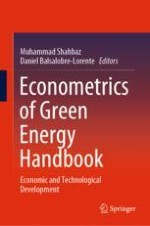2020 | OriginalPaper | Chapter
3. The Effect of Internet Use on Air Quality: Evidence from Low-Income Countries
Authors : Burcu Ozcan, Esma Gultekin Tarla
Published in: Econometrics of Green Energy Handbook
Publisher: Springer International Publishing
Activate our intelligent search to find suitable subject content or patents.
Select sections of text to find matching patents with Artificial Intelligence. powered by
Select sections of text to find additional relevant content using AI-assisted search. powered by
